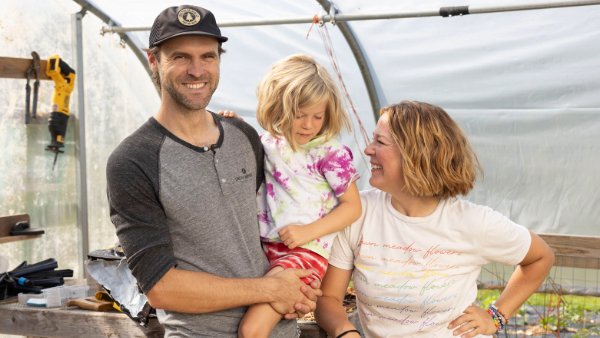“The way life should be.”
It’s the state slogan of Maine, as well as the core philosophy of residents Valerie Mankus and Tom Madden. In a harmonious meeting of aims and attitudes, the 2008 Bryant grads have built a sustainable life — and flourishing businesses — together in the Pine Tree State.
The couple’s homestead, set amid nine acres in the Portland suburb of Scarborough, nourishes both work and pleasure. There’s the leggy patch of perennials that feeds Fawn Meadow Flowers, the growing flower business that Mankus launched from her kitchen table three years ago, and the verdant vegetable garden that replenishes Madden’s spirit after a day on the job as co-founder of Portland’s Lone Pine Brewing Company.

The family home sits atop a long dirt drive, offering views over a wide meadow of flora and fauna. Six-year-old Sophie, the spitting image of her mother, happily helps tend chickens, geese, fancy feathered ducks, rescue pups Luca and Dublin, and Fred the turkey. The entire brood tolerates an ill-tempered peacock named Kevin.
Their commitment to sustainability is evident in two electric vehicles powering up in the garage. Their clean caravan delivers fresh bouquets to farm-share customers in Kennebunk, brings supplies to their Airbnb apartment in downtown Portland, and serves as the primary mode of transportation to and from Lone Pine’s commercial brewing facility in nearby Gorham.
“We consider ourselves to be a little conglomerate,” jokes Mankus about their family. “And we laugh that Sophie has no concept of traditional schedules. Tom has his thing, we have our things, and we just go."
A lifestyle by design
Mankus is candid about the personal journey she calls “from the ’hood to the homestead.” She grew up in a three-story walk-up in New Britain, Connecticut, and paid her way through Bryant, studying Economics and Finance, as a waitress at Chili’s. She put her analytical mind to work in the insurance industry through her 20s but renounced the 9 to 5 grind shortly before Sophie’s first birthday.
“I had a retirement party at age 32, which was hilarious,” she says.

When she felt pulled creatively, their property provided a way forward: sustainable flower farming. An acolyte of Martha Stewart, Mankus learned how-to from books and flower-arranging workshops. She planted her first rows of perennials during the pandemic and Fawn Meadow Flowers launched soon thereafter. An ad in The Knot reaped her first bridal client.
Her Bryant education helped to prepare her for the fits and starts of small business ownership, says Mankus. “So much of running this business is not making bouquets,” she notes. “Good foundational knowledge in business will take you anywhere.”
Mankus embraces the agricultural life but eschews the Carhartt and tractor trope: “You don’t have to cosplay farmer to care about the environment. I’m out here in a sports bra and Lululemon.”

Today, Mankus books up to 20 weddings per year from a charming storefront in downtown Kennebunk, where she also crafts hand-dyed linens and her original brand of clean soy candles and soaps.
“I believe that it matters what you bring into your home and what we put on our bodies, but not in a preachy way,” Mankus says. “The goal has always been to be approachable about sustainability; you’re not a demon if you shop on Amazon.”
Tapping into a passion
About 30 minutes away from the farm, the towering stainless steel tanks at Lone Pine Brewing are heating up. The operation’s brew crew are exacting by necessity, as temperature and pH levels make or break flavor.
Top-selling Portland Pale Ale and Brightside IPA established the brand, but the brewery also embraces iconic Maine flavors — sea salt, maple syrup, blueberries, and oysters — to create distinctive small-batch pours.
“We’ve never been bashful about getting creative,” says Madden, who sources from small, family-owned vendors. He credits the grassroots “buy local” movement for influencing both his business and Mankus’: “People started to ask, ‘Why are we buying stuff from overseas when we can grow it here?’”

Madden’s entrepreneurial drive was cultivated in childhood, watching his father run the family wine and beer store in Saco, Maine, and grew as a Finance major at Bryant. He graduated into a traditional role that “didn’t really click,” and the economy’s financial collapse in 2008 instigated a move home to Maine.
At the same time, the craft beer boom presented interesting opportunities. Madden read zealously about the science and experimented with small-batch brewing in his basement. Confidence built, he worked 20-hour days alongside his partner and best friend, John Paul, to launch Lone Pine’s first tasting room in 2016, in the industrial East Bayside neighborhood of Portland.
“It was joyful,” he remembers. “You can’t help but, for lack of a better term, get intoxicated by the process.”

In less than 10 years, the brand has earned gold awards at both the World Beer Cup and the Great American Beer Festival Competition and built a customer base across 17 states and Ireland. Lone Pine has also expanded to two tasting rooms in greater Portland: a seasonal beer garden in Westbrook and a year-round space in Old Orchard Beach.
Watching her entrepreneur parents at work, Sophie is already considering her own empire-building. The first grader predicts, “I’m going to move to Paris and make cheese.”